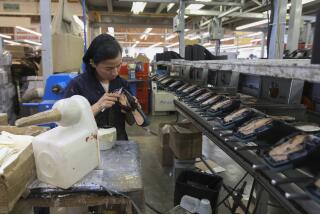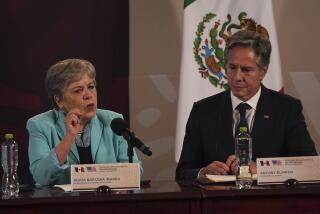Mexico Seeks Investments From Abroad
Mexico, mired in economic crisis, is revising its traditionally circumspect attitude toward foreign investment and is now aggressively courting foreign capital, two Mexican economic officials said Monday in San Diego.
“We’re opening the economy,” said Juan de Villafranca Andrade, director of the National Registry of Foreign Investments.
De Villafranca and a colleague, Jaime Alvarez Soberanis, general director of foreign investment for the Ministry of Industrial Promotion and Trade, appeared Monday at a seminar on investing in Mexico held at the University of San Diego. The appearance of the Mexican officials here is part of a Mexican campaign to attract foreign investments. Mexicans are experiencing a rapid decline in living standards as the nation staggers under the massive burdens of a $100-billion foreign debt, an inflation rate approaching 100%, the effects of last year’s devastating earthquakes and plummeting prices for oil, its chief export.
These problems, independent observers say, have been a catalyst for Mexico’s recent opening to foreign investment, particularly U.S. investment, which accounts for 67% of the $14.7 billion in direct overseas investment in Mexico in 1985, according to Mexican government figures. Government planners hope for a $2-billion growth in foreign capital this year, although Alvarez acknowledged that early figures have been below projections.
Mexican authorities have always publicly welcomed foreign investments but in reality a strong protectionist system with many bureaucratic hurdles and rigid limits has discouraged foreign investors.
The two Mexican officials said here Monday that the government’s attitude has changed since the crisis and the inauguration of President Miguel de la Madrid in December, 1982. Now, they said, foreign investors find less red tape and generally a more receptive atmosphere.
They noted that the government is actively encouraging an expansion of the maquiladora program, in which mostly U.S.-owned firms set up plants, usually along the border, that are designed to take advantage of product assembly by low-cost Mexican labor. They said the government has also reduced requirements that firms operating in Mexico be predominantly owned by Mexicans.
“This is a two-way street, in which both parties can obtain benefits,” Alvarez said.
More to Read
Sign up for Essential California
The most important California stories and recommendations in your inbox every morning.
You may occasionally receive promotional content from the Los Angeles Times.










